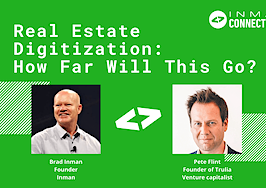Today’s the day: Join us for Inman Connect Now today to dig into key topics like relationship strategies, current and future trends, lead generation, and much more. Register now to watch the rest of the day live, and catch up on what you missed on-demand.
As states ease back into varying levels of normalcy, real estate professionals are relishing the opportunity to get back to normal with in-person meetings, showings and closings.
Nonetheless, Trulia co-founder Pete Flint warned a digital audience attending Inman’s Connect Now event on Tuesday to get ready for a new way of doing business — even after the pandemic and its restrictions elapse.
“I think one of the questions we’re all asking ourselves is when are we going to go back to normal?” he told Inman founder Brad Inman, who moderated the session, entitled “Real Estate Digitization: How Far Will This Go?.” “The reality is we’re never going back to normal, in terms of just the world that we lived in 12 to 18 months ago.”
“For years, the research process has been digitized, but now the transaction process is going to be digitized,” he added. “Of course that change is scary, but it’s going to be awesome.”
On the consumer side, Flint said digitization will remove the friction that buyers and sellers have long complained about — signing mounds of documents, providing copies of financial statements, communicating with the various players in the transaction, and trudging through the closing process.
“It’s going to take out the sort of endless copying of information from one area to another area,” he said. “They’re gonna get to a position of confidence of simplicity, which is way, way overdue.”
Flint said real estate agents will benefit too, as digitization and automation will allow them to be more efficient and deliver quicker transactions. On the other hand, digitization will bring some difficult changes that could eliminate certain agents and brokerages if they don’t find new ways to provide value.
“During my time at Trulia, we took it public and in that environment, there is this enormous pressure,” he said of the increasing number of real estate companies going public. “There will be enormous pressure on these leaders to grow and to increase profits, and the family businesses all across the country do not fit with that environment where [it’s about] efficiency and driving margin.”
Flint said agents and brokerages that serve consumers at the lower end of the market face the greatest danger of being axed, as those transactions tend to be more straightforward and can be largely automated without little agent input.
“There’s less profit and more opportunity for automation, and, as you can see, that’s where the iBuyers have been focused,” he said. “This isn’t a perfect analogy, but it’s in the same way as stock trading. Investment bankers are doing just fine. But, you know, the local stockbroker is sort of nonexistent, and so the innovation happens at the bottom.”
With that in mind, Flint and Inman agreed that legacy brands stand to lose as much as smaller competitors during this time of digitization, as evidenced by the technology arms race between Realogy and Keller Williams and younger, IPO-driven companies such as Redfin, Zillow and Compass.
“I think that the reality today is much easier for a tech company to become a real estate company than is a real traditional real estate company to become a tech company,” Flint said in reference to Keller Williams’ vow to become a tech company. “It’s just incredibly expensive to hire those engineers and stitch together these pieces of software and build these proprietary platforms.”
“[Technology] is just [in] the DNA,” he added in reference to Zillow and Opendoor. “You look at the founders of these companies, whether it’s Eric Wu or Rich Barton and these guys don’t really know about kind of the sort of emotional process of selling and buying houses, they are absolutely technologists at the heart and then adding that real estate component.”
That fact, Flint said, puts these companies ahead of the curve as consumers embrace a more digitized and streamlines real estate experience. It also puts them at the top of the heap in the eyes of Wall Street, as evidenced by the wide evaluation gap between Realogy ($1B) and Zillow ($40B).
“I’ve had many conversations with new online real estate companies, and it’s incredibly complex,” he said. “You’ve not only got the features, but you’ve got the regulatory environment, you’ve got security, you’ve got to deal with all these participants, you’ve got this workflow, and you’ve got local regulations, — it’s incredibly complex to solve these problems.”
“That’s just really hard for these big companies to navigate and be successful,” he added.
Despite these disadvantages, Flint said there’s still an opportunity for longevity and success if these brokerages and their agents are willing to adjust their value proposition and consumer target.
“There are these tech companies that are barely impersonal, but incredibly efficient at what they do,” he said.” “Then at the other end of the spectrum, I see the local experts [who are] the kind of heart and soul of real estate; they are the neighborhood expert [and] they do know what’s going on [and] they understand the other side of the story.”
“At the higher end of the market, I think the opportunity there is for agents to think of themselves [as] management consultants, investment bankers, or strategic experts to help people through more complex [transactions] and there’s more opportunity in that,” he added.
Flint also said there’s an opportunity for real estate techies to create the industry’s version of Shopify or Etsy to help smaller brokers create a comparable level of efficiency with Redfin or Compass without a treasure chest of funds.
“You’ve got companies like Shopify and maybe Etsy which are basically enabling that little guy to compete at the same level as [Walmart or Amazon],” he said. “[NFX] is investing in those types of companies that are helping enable the same experience [for real estate].”
Flint pointed to former Zillow exec Greg Schwartz’s fintech startup Tomo and Ribbon, another fintech startup that offers three all-cash offer options to help listing agents and homesellers close a deal. These companies, he said, will help real estate agents and smaller brokers be successful as the industry goes digital.
“I often say that if something can be commoditized, it will be commoditized, and I look at the financing, title and escrow and all these components of the real estate industry that will get digitized, and will get somewhat commoditized,” he finished. “But if you’re providing value as an agent, which cannot be commoditized, then I think you’re going to be fine.”









